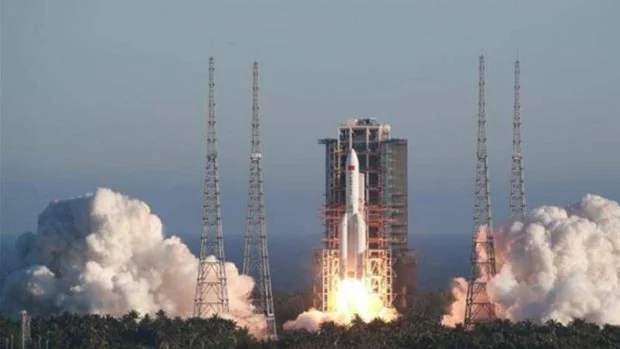 The first stage of the Chinese Long March 5B rocket, which was launched into space on April 29 with the first of the modules that will integrate the new 'Tianhe' (Celestial Harmony) space station, is out of control. The main space agencies and defense organizations are on alert due to the fall of the remains of the rocket, which measured almost 30 meters long and 5 meters in diameter. It is expected that most of the pieces of the ship will disintegrate when they come into contact with the Earth's atmosphere next Saturday, May 8, and the exact place where the remains could impact or the damage they could cause is not known if they finally land on an inhabited area.
The first stage of the Chinese Long March 5B rocket, which was launched into space on April 29 with the first of the modules that will integrate the new 'Tianhe' (Celestial Harmony) space station, is out of control. The main space agencies and defense organizations are on alert due to the fall of the remains of the rocket, which measured almost 30 meters long and 5 meters in diameter. It is expected that most of the pieces of the ship will disintegrate when they come into contact with the Earth's atmosphere next Saturday, May 8, and the exact place where the remains could impact or the damage they could cause is not known if they finally land on an inhabited area.
Currently, the rocket's orbital inclination is 41.5 degrees, which means that its remains could fall both to the north, in cities such as New York, Madrid or Beijing, and to the south, in places such as Chile or Wellington, New Zealand. However, the scientific community suggests that the remains most likely end up in the ocean, since 70 % of our planet is covered by water.
Jonathan McDowell, an expert at the Center for Astrophysics at Harvard University, assured CNN that the situation is not extremely dangerous. «I don't think people should take precautions. The risk of any damage or hitting someone is quite small. It is not negligible, it could happen, but the probability is tiny. "I would not lose a second of sleep over this as a personal threat," he said on the network.
However, in his statements to The Guardian, McDowell recalled that the last time a Long March 5B rocket was launched, large pieces of debris flew into the sky and damaged several buildings in the Ivory Coast.
Where will the rocket land?
It will not be possible to know the exact place and time where the remains of the rocket will impact. However, scientists estimate that it will come into contact with our planet's harmosphere between Saturday, May 8 and Sunday, May 9.
It is most likely that the remains will end up in the ocean and will not have any impact on the population anywhere on the globe, including Madrid. Furthermore, Holger Krag, head of the Space Safety Program Office of the European Space Agency (ESA), has stated for SpaceNews that only between 20 and 40 % of the remains of the Chinese rocket will reach Earth, since the largest part of them will disintegrate.
